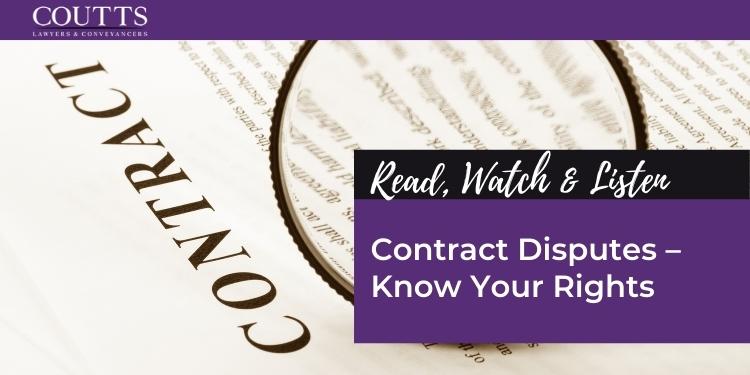Being a business owner, or engaging a business for professional services or goods, usually involves the signing of a contract or agreement to outline expectations and obligations of each party. Contracts are helpful to eliminate any potential issues due to uncertainty of terms arising in the future.
Unfortunately, contract disputes can arise as a result of differing interpretations or contested terms of the contract, changes to the contract and the obligations or expectations under it, or a failure (or anticipated failure) to perform a contract term. Contract disputes can arise between a variety of different parties, including (but not limited to):
- Suppliers and retailers
- Businesses and customers
- Business partners
- Contractors and subcontractors
- Business to business
- Landlords and tenants
When this occurs, we recommend engaging a qualified and experienced legal team, such as Coutts’ dispute resolution team, as soon as possible to negotiate a resolution and potentially keep the contract on foot.
If it is not possible, or practical, to keep the contract ongoing, you may need to consider whether the contract needs to come to an end. Bringing a contract to an end has significant legal ramifications, and we do not recommend doing so until you have received tailored legal advice as to the effect of termination or rescission of your contract.
A breach of a contract term, rescission of a contract, or termination of a contract can all give rise to damages in the contract (which means money awards to the aggrieved party). This short guide will explain this, and the associated elements, in a general nature.
What is a contract?
In order to prove a breach of a contract term, rescission of the contract, or termination of a contract, you must first show that a contract existed.
For a contract to exist, and to be legally binding, there are various basic elements that need to be met. Importantly, a contract does not need to be in writing for it to be legally enforceable – a valid and binding contract can be formed verbally.
Generally, an enforceable contract requires the following elements:
- An offer has been made by one party to the other;
“I will buy that car for $10,0000. I will pay you the $10,000.00 when you deliver the car to me. Here is the agreement noting this.”
- The offer has been accepted by that party;
“ok, I agree to selling you my car for $10,000.00, and to accept the payment when I deliver the car to you on Monday. Here is the signed agreement”.
- Consideration has been given; and
This is the feature that distinguishes a bargain from a gift. It is the ‘price’ that each party asks of the other in return for entering into the agreement. In the above scenario, it is the promise to pay the money by the first party, and the promise to deliver the car by the second party.
- The parties intended to create a legal relationship.
This is assumed in commercial relationships and transactions, and in written agreements, however, this can be less clear when dealing with transactions between family members, friends, and of course when dealing with verbal agreements (instead of a written agreement).
Breach of contract
Contracts are made to be performed, not broken. When a contract is broken, the usual remedy is ‘compensatory damages’ (meaning an order for one party to pay the other party money). Other remedies, such as specific performance or injunctions may also be available (however these are only awarded at the court’s discretion). As a general summary, the rights available to the innocent and aggrieved party depends on a number of factors, and may include:
- Payment of compensatory damages;
- Enforcing the party to perform their obligations under the agreement;
- Recovering an agreed amount that is owed under the contract; and
- Exercising the right to terminate the contract.
This short guide will focus on compensatory damages only.
The purpose of an order for damages for a broken contract is to compensate the aggrieved party for the defendant party’s wrongdoing. The amount of compensation is assessed so that the aggrieved party is put in the same position as if the contract had been performed.
To be awarded an order for damages for breach of contract, there are again various elements that must be demonstrated to the court. These are:
- That the plaintiff (the aggrieved party) has a ‘cause of action’.
It must be shown that a) a contract was in place, and b) that contract has been breached.
- That the defendants (the wrongdoer) breach has injured, or caused a loss, to the plaintiff. This is the ‘element of causation’.
It must be shown that the loss suffered, was in fact, caused by the defendants’ breach of contract. The traditional view, and the general rule of thumb test, is to ask: “but for” the defendant’s wrong, would the plaintiff have suffered the loss?
- That the loss suffered by the plaintiff is not too remote. This is the ‘test of remoteness’.
It must be shown that the loss is such that it would be fairly, reasonably, and naturally arise in the usual course of things as a result of the breach of contract.
- That the plaintiff has not breached their duty to mitigate unnecessary loss.
A plaintiff has an obligation to take reasonable steps to reduce loss and to avoid unnecessary losses.
Conclusion
A breach of contract, or contract dispute, can be a daunting and frustrating experience. Disputes of this nature can cause significant financial strain for those involved, not to mention stress and unease. If you are involved in a contract dispute, it is essential to seek professional advice as early as possible so you can understand your rights, what you are entitled to, and what action can be taken.
Our disputes resolution team are experienced in a broad range of contract disputes and are focused on providing you with straightforward, practical advice. Our disputes resolution team can assist you with all forms of dispute resolution, whether it be negotiation, mediation, arbitration or court proceedings.
Breach of contract or contract dispute? We can help.
Contract disputes can be extremely frustrating and can become unnecessarily prolonged and delayed if not dealt with efficiently and effectively. Coutts’ disputes resolution team have the necessary experience and skills to assist you with all types of contract disputes, and to help you reach a resolution that is both commercial and practical for all parties involved.
Contact Coutts Lawyers & Conveyancers office today.
This blog is merely general and non-specific information on the subject matter and is not and should not be considered or relied on as legal advice. Coutts is not responsible for any cost, expense, loss or liability whatsoever in relation to this blog, including all or any reliance on this blog or use or application of this blog by you.



